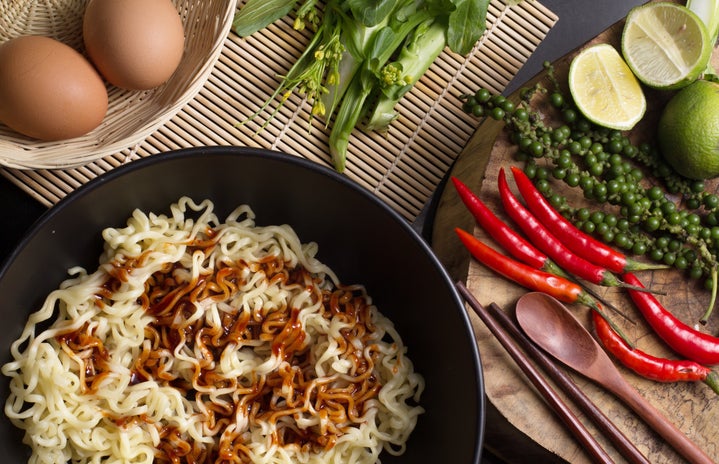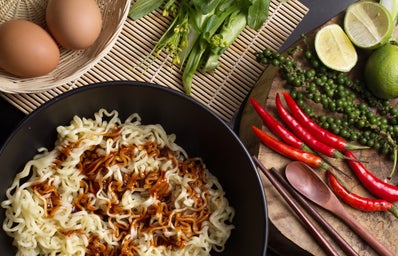As we enter the month of Ramadan, we begin to think of ways to share our fortune and ways of expressing our gratitude and apologies towards our loved ones. After all, Ramadan is all about giving and forgiving. But we also start thinking about what to eat for iftar (the end of the day where Muslims break their fast) and the meals we will be sharing during family gatherings. To me, Ramadan is also about food. Spending 18 years of my fasting month in Indonesia, I was spoiled with different kinds of snacks during iftar—ranging from the oily fried tofu sold at the cart across the street, to the gooey sweet potato balls (kolak biji salak)—and five different plates of opor ayam, as we travel from one relative’s house to another during Eid al-Fitr (the end of Ramadan month). Now a third year university student in Japan, I can no longer enjoy home cooked, spice filled dishes that I was so used to consuming in my younger years. Instead, I am left with microwaved instant rice and supermarkets with a spice rack filled only with six different brands of shoyu.
Now, five days into fasting month and I am running out of my Indonesian instant spices. I’ve been racking my brains trying to figure out what to eat, but my busy schedule and (dare I say) boring supermarket spices keeps me from whipping up the meals I was so used to eating during Ramadan as a child. Despite this, I make sure I am stocked up with two essential Indonesian sauces to remind me of my childhood dishes, sambal and kecap manis. Anyone who has ever gone eating with me, knows I carry at least four packets of sambal or chilli sauce in my bag, and I make sure to always express my love and gratitude for “Saus Cabe Dua Belibis” (Dua Belibis Chilli Sauce) for keeping me sane in my Japanese food ventures. But kecap manis is kind of an unsung hero for me.
When Chinese traders in the 1800s arrived in Indonesia, they found that the locals didn’t quite like their soy sauce. They also found out that the arrays of palm trees in the land was what made Indonesia such a large palm sugar producer, and that unsurprisingly, Indonesians had a sweet tooth. The Chinese merchants then mixed the soy sauce and palm sugar, resulting in what we now know as kecap manis (meaning sweet soy sauce). Kecap manis is a must in all Indonesian kitchens. We use it as a dipping sauce, on our fried rice, even in soups; add it to any of your dishes and it will bring out the sweet and umami flavor. Although I am seven hours away from Indonesia, the kecap manis standing on my sauce rack keeps me reminded of home.
Of course, to me, food is the essence of my Ramadan experience, but it is also the strong sense of community I feel, whenever my family and friends break our fast together. Admittedly, the bond formed through our meals and our shared experience of fasting, brings a sense of comfort and company that is absent when I fast alone. On occasion, my friends and family back in Indonesia will send pictures of their food, and I get consumed by jealousy and hunger – but also pleasure and joy. Even though the COVID pandemic may be preventing us from celebrating the holiday with our loved ones, social media and family WhatsApp group chats makes sure we stay connected during fasting month, and there is nothing that makes me happier than seeing my friends and family eating well (and of course enjoying some fried tofu).
As Ramadan also celebrates sharing, here are three of my favorite ways to use kecap manis!
1. As a marinade
Marinating meat in garlic and kecap manis makes for a great grilled dish. If you want to go the extra mile, place your marinated beef, chicken, lamb, etc on a skewer to make satay.
2. For stir fry
The only way for me to eat vegetables is if it’s stir fried. Cook some garlic in an oiled pan before mixing your veggies in, and add your kecap manis. I also like to add oyster sauce or sesame oil depending on my mood.
3. To drizzle on your food
Ahh.. the easiest way to enjoy kecap manis. Simply drizzle them on your food—on omelettes, soups, plain rice, literally anything you have cooked, and it will taste great.


